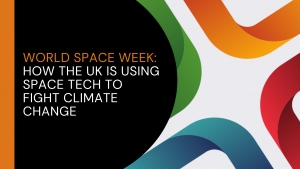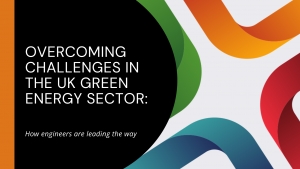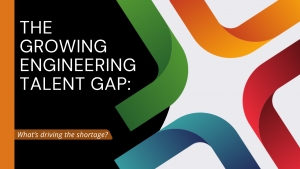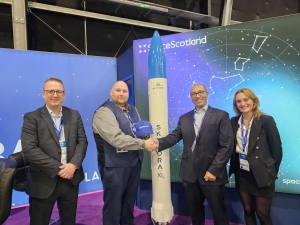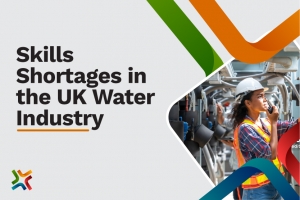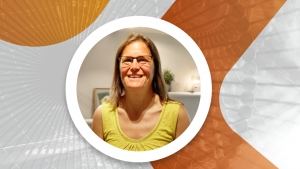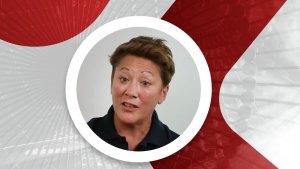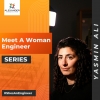Alexander Associates
World Space Week 2024, celebrated from October 4th to 10th, brings attention to a pressing global issue—climate change. This year's theme, "Space & Climate Change," emphasises the pivotal role space technology plays in understanding, mitigating, and adapting to environmental shifts. Across the globe, satellites and space technology have become indispensable tools for monitoring our planet's health, and the UK is at the forefront of these advancements.
The Power of Space in Climate Action
In the past few decades, space technology has revolutionised the way we monitor the environment. Satellites now track everything from deforestation and polar ice melt to sea level rise and atmospheric CO2 levels. They provide real-time data that governments, scientists, and climate agencies rely on to shape policies and strategies aimed at combating climate change. For example, Earth observation satellites provide critical insights that are crucial for forecasting extreme weather events, understanding agricultural productivity, and managing natural disasters.
The theme of World Space Week 2024, "Space & Climate Change," underscores how innovations in space technology are driving climate action. But one nation in particular is playing a notable role in this endeavor: the UK.
The UK Space Sector’s Role in Climate Monitoring
The UK space industry has grown significantly in recent years, with the sector now contributing £17.5 billion to the UK economy annually. Employing over 47,000 people, the industry is a hub for cutting-edge research and development. At the heart of this boom is a concentrated effort to use space technologies to address environmental challenges. The UK Space Agency, in collaboration with private industry and academic institutions, has prioritised satellite technology that advances climate research and monitoring capabilities.
The UK is home to world-leading satellite manufacturers and data analytics companies that provide invaluable insights into environmental changes. One of the key programs supported by the UK Space Agency is the development of Earth observation satellites designed to improve our understanding of global climate systems. These satellites offer detailed data on:
- Greenhouse gas emissions
- Sea level fluctuations
- Deforestation patterns
- Ocean health and biodiversity
In fact, the UK Space Agency has been heavily investing in satellite systems and technologies that enable precise climate monitoring. As part of its National Space Strategy, the UK aims to enhance its capabilities in Earth observation, building on its partnerships with the European Space Agency (ESA) and other international organisations.
Key Investments in Satellite Technology for Climate Monitoring
In recent years, the UK government and its space agency have ramped up funding towards satellite technology to meet the challenges posed by climate change. For example:
- Copernicus Earth Observation Program – The UK has remained a key contributor to the Copernicus program, one of the most advanced Earth observation systems in the world. Copernicus satellites monitor global climate data and offer open-access information that assists with everything from weather forecasting to long-term climate modeling.
- £5 Billion Investment in Space Technologies – As part of the National Space Strategy, the UK government has committed to significant investments, including £5 billion over the next 10 years. Much of this funding is directed towards Earth observation, satellite communication, and environmental monitoring technologies, which directly support climate action.
- International Collaboration – The UK Space Agency is also working on initiatives such as the ClimateSpace partnership, which brings together various international stakeholders to use satellite data to address climate issues. Collaborating with global agencies ensures the UK remains a key player in monitoring and addressing climate-related challenges.
Real-World Impact: Satellites in Action
Several UK-based companies and satellites are already making a difference. The UK’s NovaSAR-1 satellite, for instance, uses radar technology to monitor the Earth's surface regardless of weather conditions or daylight. This satellite has been used to track deforestation in the Amazon, a critical task in the fight against climate change.
Additionally, companies like Surrey Satellite Technology Ltd (SSTL) and Earth-i are developing small, affordable satellites that can provide high-resolution Earth imaging, enabling more precise climate data. These innovations help ensure the UK remains at the forefront of global efforts to monitor and combat climate change.
The Future of Space and Climate Action
As the world grapples with the realities of climate change, space technology will play an increasingly vital role in providing solutions. Oxfordshire-based business, Space Solar, hopes to launch the first solar farm into space with plans to power more than a million homes by the 2030s with mile-wide complex of mirrors and solar panels orbiting 22,000 miles above the planet. The innovative CASSIOPeiA design, tested successfully at Queen's University Belfast, demonstrated the ability to wirelessly beam energy from space to Earth. Space solar panels capture 13 times more energy than ground-based panels due to higher light intensity and the absence of atmospheric interference. This could revolutionise renewable energy systems and significantly reduce our reliance on fossil fuels.
Conclusion
As climate change intensifies, space technology will become increasingly essential. The UK’s investments in satellite technology and innovations like space-based solar power offer transformative solutions to environmental challenges. By leveraging space to monitor and mitigate climate impacts, the UK is shaping a sustainable future for both its economy and the planet.
The green energy sector in the UK is growing rapidly, driven by the need for sustainable solutions to combat climate change. In fact, renewable energy accounted for 42.8% of the UK’s electricity generation in 2023, according to the Department for Business, Energy & Industrial Strategy (BEIS). As impressive as this figure is, the transition to a fully renewable energy system still faces significant challenges—ranging from technological limitations to fluctuating government policies. Engineers and technicians are at the heart of addressing these issues, pushing forward innovation to ensure the green energy sector reaches its full potential.
In this blog post, we’ll explore the key challenges facing the green energy industry in the UK and the engineering solutions driving the sector toward a sustainable future.
1. Intermittency of Renewable Energy Sources: Solving the Storage Problem
One of the most pressing challenges in the renewable energy sector is the intermittency of sources like wind and solar. Renewable energy generation can fluctuate based on weather conditions, leading to periods of over- or under-supply. For instance, while wind power is an abundant resource in the UK, a particularly calm week can severely reduce energy production.
To counter this, engineers are developing advanced energy storage systems that allow excess energy to be stored during high production periods and released when demand peaks. Battery storage capacity in the UK grew by 45% in 2022, and further investment in grid-scale batteries and innovative storage technologies, such as pumped hydro and compressed air energy storage, is crucial. Engineers are also working on smart grid technologies that allow for more efficient energy distribution, adjusting supply dynamically based on real-time demand.
Takeaway: Investing in cutting-edge energy storage and smart grid systems is key to unlocking the full potential of renewable energy in the UK, ensuring a stable and reliable energy supply.
2. High Initial Costs of Green Energy Projects: Engineering Cost-Effective Solutions
Despite the long-term benefits of renewable energy, the high upfront costs of green energy projects remain a significant barrier for widespread adoption. Building infrastructure, such as offshore wind farms or solar arrays, requires considerable investment. While the costs of renewable technologies have dropped—offshore wind prices in the UK fell by 30% between 2017 and 2020—further cost reduction is necessary to make green energy more accessible.
Engineers are working on solutions to reduce the financial burden of green energy projects. This includes developing modular wind turbines that can be deployed more quickly and cost-effectively, as well as scalable solar panels that are easier to install and maintain. In addition, there’s increasing collaboration between engineers and policymakers to secure government subsidies and long-term funding for green energy projects, ensuring that upfront costs don’t hinder progress.
Takeaway: By innovating cost-effective technologies and working alongside policymakers, engineers are making renewable energy more financially viable for both businesses and consumers.
3. Skills Gap in the Green Energy Sector: Upskilling the Workforce
As the green energy industry expands, the demand for skilled engineers and technicians has skyrocketed. The UK’s green energy sector is expected to create up to 440,000 jobs by 2030, according to the UK government. However, a growing skills gap threatens to slow this progress. Finding engineers with the necessary expertise in renewable technologies, energy storage, and grid systems remains a significant challenge for businesses in the sector.
To address this, companies are focusing on upskilling their existing workforce and partnering with educational institutions to develop specialised training programs. Apprenticeships and vocational qualifications in green technologies are on the rise, helping to bridge the skills gap. According to a report from the National Grid, over 200,000 roles related to energy efficiency and renewable generation will need to be filled by 2050. Engineering firms are also collaborating with universities to ensure graduates are equipped with the skills needed to thrive in this fast-evolving industry.
Takeaway: Upskilling and attracting new talent to the green energy sector is vital to support the growing demand for renewable technologies and to ensure the UK remains a leader in the global energy transition.
4. Fluctuating Government Policies: Securing Long-Term Investment
The green energy sector is heavily influenced by government policies and regulations. Fluctuations in policy can create uncertainty for investors and companies, slowing down the development of renewable projects. For instance, changes to subsidy schemes or delays in green energy targets can put projects on hold, stifling innovation and investment.
Despite these challenges, collaboration between engineers and policymakers is helping to create a more stable regulatory environment. The UK government’s Net Zero Strategy is a step in the right direction, aiming to reduce carbon emissions by 78% by 2035 and achieve net zero by 2050. Engineers are playing a critical role in advising policymakers on the most effective technologies and strategies to achieve these ambitious targets.
Takeaway: Building strong partnerships between the public and private sectors is essential to create stable policies that encourage long-term investment in green energy projects.
5. Sustainable Infrastructure: Engineers Leading the Way in Design and Development
Transitioning to a green economy requires sustainable infrastructure that supports the growth of renewable energy. Engineers are at the forefront of designing solutions that integrate renewable technologies with existing infrastructure while ensuring minimal environmental impact. Whether it’s the development of offshore wind farms, tidal power plants, or solar-powered urban areas, engineers are reshaping the UK’s energy landscape.
In 2023, the UK’s offshore wind capacity reached over 13 gigawatts, making it a global leader in this technology. However, expanding this capacity requires innovative infrastructure designs that balance energy production with environmental sustainability. Engineers are working on solutions such as floating wind farms, which can be deployed in deeper waters, and hybrid systems that combine solar and wind energy for greater efficiency.
Takeaway: Sustainable infrastructure design is essential to the future of green energy in the UK, with engineers playing a pivotal role in ensuring that new developments meet both energy demands and environmental goals.
Conclusion: Engineers Are Key to Unlocking the UK’s Green Energy Potential
The green energy sector in the UK is growing at an unprecedented rate, but significant challenges remain. Engineers are leading the way in overcoming these obstacles, from solving the intermittency of renewable energy through advanced storage systems to reducing the high costs of projects through innovative designs. Addressing the skills gap and working closely with policymakers will be essential in ensuring long-term success.
About Alexander Associates
Since our founding in 1989, Alexander Associates has recognised the vital role engineers play across various industries. We specialise in connecting UK companies with the talented professionals essential for driving innovation and sustainability in the energy sector. Whether you need experienced engineers or are looking to develop a long-term hiring strategy, we're here to support your recruitment needs.
Ready to power the future? Let’s chat! Reach out to us to explore how we can help your business achieve its green energy goals.
Sources:
- Department for Business, Energy & Industrial Strategy (BEIS). (2023). UK Energy in Brief 2023. Available at: UK Government BEIS Report
- National Grid. (2020). Building the Net Zero Energy Workforce. Available at: National Grid Workforce Report
- McKinsey & Company. (2020). Diversity Wins: How Inclusion Matters. Available at: McKinsey Diversity Report
- Recruitment & Employment Confederation (REC). (2021). Recruitment and Talent Acquisition Trends. Available at: REC Report
- Women’s Engineering Society (WES). (2021). Statistics on Women in Engineering. Available at: WES Report
- UK Government. (2021). Net Zero Strategy: Build Back Greener. Available at: Net Zero Strategy
- LinkedIn. (2020). Global Recruiting Trends Report. Available at: LinkedIn Recruiting Trends
The UK is facing a critical shortage of engineering talent, with a recent EngineeringUK report revealing the need to recruit 124,000 engineers and technicians annually just to keep pace with demand. This startling figure is not unique to the UK—it mirrors a global crisis, fueled by rapid technological advancements and an aging workforce. As industries increasingly rely on cutting-edge technologies, the gap between the demand for skilled engineers and the available workforce continues to widen. To address this urgent issue, it's crucial to understand the root causes driving the shortage and explore strategies to close the gap.
Overview of the Engineering Talent Gap
The engineering talent gap refers to the growing disparity between the demand for qualified engineers and the available supply within the workforce. According to The Royal Academy of Engineering, the UK's engineering skills shortfall is costing the nation £1.5 billion annually. Globally, countries like the USA and Germany face similar challenges, with projections indicating a continued rise in demand for engineering professionals, particularly in emerging fields like AI and renewable energy. So, what is driving this growing shortage of engineering talent?
1.Rapid Technological Advancements
One of the most significant contributors to the engineering talent gap is the breakneck speed at which technology is evolving. Engineering is witnessing a revolutionary transformation, driven by groundbreaking advancements in artificial intelligence (AI), robotics, renewable energy, and more. These fields necessitate new competencies, ranging from data analytics and machine learning for AI applications to specialised knowledge in sustainable materials for renewable energy projects. Such dynamic evolution demands engineers with multifaceted skill sets that traditional education systems are currently struggling to produce.
For instance, industries are now heavily reliant on data science, machine learning, and software-driven solutions, which means engineers must be well-versed not only in traditional disciplines like mechanical or electrical engineering but also in software development, data analytics, and cybersecurity. This demand for hybrid skills often outpaces the ability of educational systems and on-the-job training programs to keep engineers up to date with the latest technologies. The result is a widening gap between what employers need and the capabilities that existing engineers offer.
2. Aging Workforce
The engineering sector is on the brink of a demographic crisis, with a significant proportion of the workforce nearing retirement age. This retirement wave signifies not just a reduction in numbers but also a loss of invaluable institutional knowledge and expertise that is not easily replaced. According to various reports, the baby boomer generation, which has been a driving force in the engineering field for decades, is gradually exiting the workforce. In countries like the United States, nearly 25% of the engineering workforce is expected to retire within the next decade.
This creates a massive void not only in terms of the sheer number of engineers leaving but also in terms of the knowledge and experience that retiring engineers take with them. Current succession planning practices are often inadequate, with organisations failing to implement effective strategies for knowledge transfer and leadership development. Adopting best practices such as structured mentorship programmes and phased retirement plans can mitigate the impact of this demographic shift, ensuring continuity and sustained innovation.
3. Educational Gaps and Outdated Curricula
Another key driver of the engineering talent gap is the disconnect between the skills being taught in educational institutions and the demands of the modern workforce. While universities and colleges still provide strong foundational knowledge in engineering, many institutions are slow to adapt to new industry requirements. This lag results in graduates who are ill-prepared to immediately contribute to highly technical and rapidly evolving fields.
STEM education, particularly in engineering, continues to struggle with attracting and retaining students. Engineering and technology degrees in the UK have the third-highest dropout rate, with 7.2% of students not completing their courses, according to UK Government data. Many students find the curriculum either too challenging or not engaging enough, leading to higher dropout rates compared to other fields. To help bridge this talent gap, corporate training programs and in-house upskilling initiatives have proven effective. Strengthening public-private partnerships can further enhance these efforts, driving innovative solutions and fostering a more skilled workforce through collaborative ventures.
4. Global Competition
The global competition for engineering talent is increasingly fierce, with countries vying to attract and retain skilled professionals. In the UK, nearly 25% of engineering firms have reported difficulties filling engineering vacancies, a challenge exacerbated by the migration of talent to countries offering better incentives such as higher salaries or advanced research opportunities. For example, Australia and Canada have introduced targeted visa schemes and research funding packages to attract engineers, putting additional pressure on the UK's talent pool.
Outsourcing engineering work is another factor affecting domestic talent. The UK has seen a rise in engineering outsourcing, with the global engineering services outsourcing market projected to grow by over 20% by 2026. While this may provide cost-effective solutions in the short term, it reduces the incentive for UK companies and education systems to develop domestic talent. Over time, this weakens the pipeline of homegrown engineers, particularly in areas like AI and renewable energy.
Countries like China and India, which together produce over 4 million engineering graduates annually, are heavily investing in STEM education, intensifying global competition. In contrast, the UK produces around 46,000 engineering graduates each year, creating a growing skills gap as Western nations struggle to keep up with the output and investment from emerging economies. This underscores the need for the UK to invest in upskilling its domestic workforce to remain competitive in the global engineering sector.
5. Inadequate Focus on Diversity and Inclusion
Diversity in the engineering workforce is essential for fostering innovation, yet the sector has long struggled with inclusivity challenges. Women, ethnic minorities, and other underrepresented groups often encounter barriers that deter them from entering the field. This lack of diversity narrows the talent pool and limits the range of perspectives that fuel creative problem-solving in engineering. In the UK, the number of women in engineering and tech has decreased by 38,000, with their representation dropping from 16.5% of the workforce in 2022 to just 15.7% in 2023, according to EngineeringUK.
Closing the talent gap requires more than just producing more engineering graduates; it calls for dedicated efforts to make the profession more inclusive. These efforts include targeted recruitment, mentorship programs, and fostering work environments that embrace diversity and different viewpoints. Flexible working policies, especially for mothers and caregivers, are also critical in supporting women’s participation in the engineering workforce. Such policies help to address the challenges of work-life balance, making it easier for women to continue their careers after starting families. Initiatives such as Women in Engineering networks and flexible work arrangements have shown promise in breaking down these barriers, helping to build more diverse and innovative engineering teams.
Conclusion
In short, the engineering talent gap is a big issue with many moving parts—rapid tech growth, an aging workforce, outdated education, global competition, and a lack of diversity all play a role. Addressing this growing shortage requires a collaborative effort between governments, educational institutions, and industries. By encouraging diversity, improving education, and supporting continuous learning, we can start closing the gap. If we don’t take action now, the shortage will only get worse, slowing down innovation and growth when we need it most.
References
- EngineeringUK Report
- The Royal Academy of Engineering
- Additional industry reports and studies
- Higher Education Statistics Agency (HESA)
- OECD Report
- Market Research Reports (e.g., from Statista or Technavio) on global engineering services outsourcing, with projections up to 2026.
- World Economic Forum reports on STEM graduates.
- UNESCO and OECD reports on global STEM education trends.
Skyrora, a British private space company, has partnered exclusively with Alexander Associates as their RPO provider for the next 3 years.
Kent, England – 23rd July 2024 Alexander Associates is pleased to announce that it has been appointed as Skyrora’s exclusive RPO provider.
Headquartered in Cumbernauld, Scotland, Skyrora represents the next generation of private launch vehicle manufacturers and aims to meet the demand for launch vehicles in the burgeoning small satellite market.
Skyrora began its recruitment relationship with Alexander Associates in 2023. Based on the success of this partnership, Skyora has awarded Alexander Associates sole RPO status for the next 3 years.
Of the announcement Peter Webb (Director) says, “We are incredibly proud to be appointed exclusive RPO provider to Skyrora. As an organisation, they place equality, diversity and sustainability at the heart of their values, which strongly resonates with our own beliefs and approach.”
Derek Harris, Head of Business Operations, Skyrora commented:"It can be difficult to find the right person for some of the more technical roles that we require when dealing with launch vehicles. Alexander Associates have spent time getting to know our team and culture to help make sure our requirements are filled with quality over quantity.”
“It has been a pleasure to work with Skyrora and the talent of tomorrow, to drive the space industry forward, together. We look forward to continuing this collaboration to promote equality, diversity, and inclusion within the UK space industry,” continues Peter Webb.
About Alexander Associates
Alexander Associates is one of the leading suppliers of professional staff to the engineering sector. Established in 1989, its clients include blue chip consulting engineers, design and build contractors, utility companies and boutique architecturally-led consulting engineer consultancies. Passionate about promoting equity, diversity and inclusion, its ethics are defined by its staff who are honest, hardworking and will only do what is right.
Contacts:
Peter Webb
Director, Space Recruitment
Peter.webb@alexander-assoc.co.uk
Location:
4 The Old Yard
Rectory Lane
Brasted
Westerham
Kent
TN16 1JP
UNLOCK YOUR CAREER POTENTIAL IN MEP ENGINEERING
Are you an engineer considering a specialisation in MEP (Mechanical, Electrical, and Plumbing) disciplines? The MEP sector is not only integral to the construction and infrastructure industry but also offers a plethora of opportunities for career growth and development. In this blog, we'll explore the benefits of specialising in MEP, share top tips for aspiring MEP engineers, and discuss how you can unlock your career potential in this dynamic field.
Why Specialise in MEP?
High Demand
The MEP sector is experiencing significant growth. According to recent industry reports, the global MEP services market is expected to reach £165 billion by 2027, growing at a CAGR of 5.4%. This robust growth translates to increased demand for skilled MEP engineers. As construction projects become more complex and technology-driven, the need for professionals who can design, implement, and maintain sophisticated MEP systems is greater than ever.
Diverse Opportunities
MEP engineering encompasses a variety of roles, including HVAC (Heating, Ventilation, and Air Conditioning) design, electrical systems engineering, and plumbing consultancy. This diversity allows for a broad range of career paths and specialisation areas. Whether you are interested in designing energy-efficient HVAC systems, ensuring the reliability of electrical networks, or creating effective plumbing solutions, the MEP sector offers numerous opportunities to match your interests and skills.
Sustainable Future
With a growing focus on sustainable building practices, MEP engineers are at the forefront of integrating green technologies. The UK's commitment to net-zero carbon emissions by 2050 further underscores the importance of MEP professionals in shaping a sustainable future. By specialising in MEP, you can contribute to the development of buildings that are not only efficient and cost-effective but also environmentally friendly.
Top Tips for Aspiring MEP Engineers
Gain Relevant Experience
Hands-on experience is invaluable in the MEP sector. Seek internships and entry-level positions that offer exposure to MEP projects. This practical experience is crucial for understanding the complexities of MEP systems and will give you a competitive edge when applying for advanced roles.
Pursue Advanced Education
Consider obtaining certifications such as LEED (Leadership in Energy and Environmental Design) or CIBSE (Chartered Institution of Building Services Engineers) credentials. Advanced education and specialised certifications can significantly enhance your career prospects. These credentials demonstrate your commitment to the field and your expertise in sustainable building practices and advanced engineering techniques.
Stay Updated with Industry Trends
The MEP sector is continually evolving with advancements in technology and best practices. Keeping abreast of the latest trends and innovations, such as Building Information Modelling (BIM) and smart building technologies, will ensure you remain competitive in the job market. Regularly reading industry publications, attending seminars, and participating in webinars are excellent ways to stay informed about new developments.
Network with Professionals
Join professional organisations and attend industry conferences. Networking with other professionals in the field can provide valuable insights, mentorship, and opportunities for career advancement. Organisations such as the Chartered Institution of Building Services Engineers (CIBSE) and the Institution of Mechanical Engineers (IMechE) offer networking events, training courses, and resources that can support your professional growth.
Focus on Soft Skills
Effective communication, problem-solving, and project management skills are essential for MEP engineers. These soft skills are critical for successful collaboration with architects, contractors, and clients. Developing your ability to communicate technical information clearly, manage projects efficiently, and solve problems creatively will enhance your effectiveness and reputation as an MEP engineer.
Conclusion
Specialising in MEP engineering not only promises a rewarding career but also positions you at the heart of innovative and sustainable building solutions. By gaining relevant experience, pursuing advanced education, staying updated with industry trends, networking, and honing your soft skills, you can unlock new career opportunities and achieve professional excellence.
Ready to take the next step in your MEP career? Connect with us today to explore exciting job opportunities and receive tailored career advice. Whether you're just starting out or looking to advance your career, our team of experts is here to help you succeed.
Explore the future of MEP engineering and unlock your potential today!
About Us
As a leading recruitment agency specialising in engineering disciplines for over 35 years, we are dedicated to helping professionals like you achieve their career goals. With our deep industry knowledge and extensive network, we provide expert guidance and support throughout your career journey. Contact us today to learn more about how we can assist you in your career development.
Email: Recruit@alexander-assoc.co.uk
Phone: 01959 562 572
Skills Shortages in the UK Water Industry
The demand for water and wastewater services in the UK continues to swell as the industry grapples with a serious skills shortage. Tackling this issue requires a comprehensive approach, from embracing technology and diversity to fortifying training programmes, to fostering stronger collaborations between academia and industry.
But amid these challenges is a realm of opportunity. With UK water companies recently announcing plans to invest the largest amount of money into the industry on record, attracting professionals to industrial water jobs could be that little bit easier.
Let’s look at what the investment entails, alongside the current talent challenges and where job opportunities lie for graduate engineers and apprentices in the UK water industry.
Exciting Water Industry Jobs on The Horizon
Last year, the largest water companies in the UK set forth a record-breaking proposal – to invest £96 billion into water and sewage infrastructure between 2025 and 2030. It will create more than 30,000 new jobs in water treatment and 4,000 new apprenticeships – a 50% boost to the current workforce.
The plans include building ten new reservoirs to secure water supplies, as well as cutting leakage by over a quarter by 2030. This includes an £11 billion investment to upgrade sewage infrastructure to reduce overflow spills, create ‘smart sewers’ using technology to intelligently control flows, as well as new nature-based schemes to manage rainwater. It’s touted as the most ambitious modernisation of sewers since the Victorian era.
Challenges Across the Industry and How to Address Them
Unfortunately, the UK water sector has faced many years of underinvestment and mismanagement. These factors led to insufficient maintenance and inefficient resource allocation, exacerbating the decline of ageing water infrastructure and decreasing its overall performance.
It appears the record levels of investment announced will go a long way towards addressing these challenges. But there is another challenge taking precedence, as water infrastructure is facing the same issue as the water workforce – it’s ageing.
According to the Water Industry Journal, more than 20% of those in water industry jobs will retire in the next decade. That’s a large accumulation of knowledge due to leaving the sector.
In stark contrast, just 8% of the UK water sector workforce is aged under 24. Addressing these dual challenges requires a multi-faceted approach, and here are a few suggestions to help you tackle this pressing issue.
Go Digital
The UK water industry is increasingly adopting digital technologies to improve efficiency, sustainability, as well as supply and infrastructure resilience. Tech such as data analytics, Internet of Things, artificial intelligence (AI) and remote monitoring are transforming how water and wastewater systems are managed and maintained.
For instance, Anglian Water became the UK’s first water organisation to implement digital twin technology. The tech is pre-emptive – it creates a digital representation of the region’s water treatment and distribution infrastructure to pinpoint where leaks are likely to happen before they actually do.
Another example is the Dutch water authority Vallei en Veluwe, which manages 16 wastewater treatment plants in the Netherlands. They use AI within their wastewater transport and treatment control systems to predict critical changes in flow and automate the appropriate response, saving their engineers hours of time. They also use machine learning to automate key controls, like pump and valve adjustment, to optimise nutrient removal and reduce energy and chemical use without direct worker involvement.
With the increasing integration of technologies, Engineers who possess digital skills (or those who are interested in developing them) are highly in demand.
Many water engineering jobs of the future will include AI, data science and software engineering skillsets.
Go Diverse
An Energy and Utilities Skills Partnership report found women make up only 29.1% of the UK water industry workforce, compared to 47.3% of women across all sectors. There’s clearly room for improvement to bring the sector in line with the nation’s average.
There is a host of strategies you can use to attract more women into your workforce, particularly in to technical roles. It begins with ensuring your recruitment policies and materials are inclusive, paying particular attention to your job advertisements to remove any real or perceived barriers to employment. This is a task a specialist water and wastewater recruitment partner can assist with, like us here at Alexander Associates.
Other ways to attract female water talent are to have flexible working policies, enhanced leave entitlements (for instance, maternity, adoption, paternity, shared parental and elder care), as well as train and promote from within. Some water companies also have specific employee leadership training programmes for this purpose.
Go Young
With so many skilled water professionals retiring, it’s important to look to the younger generation to replace them. According to the Energy and Utilities Skills Partnership report, just 9.2% of those currently working in water industry jobs are aged 16-24.
A key way to boost this figure is to take on apprentices. While you can reach out to new potential talent, it’s also worth looking within. You may have existing younger employees who are interested in up-skilling, perhaps from a general labourer role to becoming a certified water treatment plant operator.
Keep an eye out for opportunities to involve your older workforce in these schemes. Their transfer of knowledge built from years in the industry is invaluable to not only your younger employees but your business overall.
There are a number of additional avenues for connecting with younger possible hires, from exhibiting at careers fairs to talks about your work in water at schools. These can be virtual, blended or face-to-face.
Go Broad
As water skills are in scarce supply, expanding your hiring parameters can be extremely beneficial. Instead of only looking for those with water experience, you can include candidates with a solid foundation of core engineering and/or project manager competencies.
Engineering Jobs with Transferable Skills for the Water Industry
Examples of engineering disciplines with transferable skills include Environmental Engineers, who can transfer their experience from the energy or waste management sector directly to water. Industrial Engineers can use their knowledge of optimising complex systems and processes to improve the efficiency and effectiveness of water treatment and distribution systems.
Mining Engineers have key insights into extracting and managing natural resources that apply to water resource management. Agricultural Engineers are somewhat similar, with a foundation in irrigation systems design and water conservation practices. And ex-Military Engineers with water infrastructure experience also have highly transferable skills that can be invaluable in a range of projects.
Find Support for Hiring Engineers or Applying for Industrial Water Jobs
Addressing the UK’s water skills shortage requires proactivity. This includes investment in training, fostering collaboration and being open to widening your hiring talent pool.
Alexander Associates can help you source the candidates needed to drive success in your business, from curating the right recruitment materials all the way through to offer negotiations. If you’re an engineer with transferable skills for the water industry and looking for a career change, we can help you with that, too. Please contact one of our specialists today.
Whether you’re an Engineer looking for a fresh and exciting employment prospect or an employer in the nuclear industry, what you’ll find here is a comprehensive exploration of projected nuclear jobs demand, alongside the key skills needed for these positions.
Our technical recruitment experts also offer important advice about how to find talent with transferable engineering skills to fill these open nuclear roles.
UK Nuclear Jobs – Current Demand & Projections
According to the Nuclear Industry Association, nuclear energy has saved the UK 2.3 billion tonnes of carbon emissions, far more than any other source.While the UK currently generates 15% of its electricity from green nuclear, the government has set an ambitious target to increase this to 25% by 2050. With it comes an investment of £1.7 billion, much of this into new nuclear behemoth builds.
Of course, this means new nuclear energy jobs … and lots of them! According to the most recent Nuclear Workforce Assessment, from 2023 to 2043 the current 83,000-strong nuclear workforce is forecast to rise anywhere between 123,000 to 180,000.
That’s close to a 120% increase in new nuclear jobs, both for seasoned professionals as well as newcomers to the field. In addition, our industry intel tells us that nuclear jobs are stable and very well paid.
To illustrate the scale of new nuclear builds, Somerset’s Hinkley Point C is one of the biggest, employing 9,500 employees. Over 1,000 apprentices have been trained on the project to date, with owners estimating the total project requires 25,000 workers, 900 of who will remain permanently.
Then there’s the Rolls-Royce-led development of Small Modular Reactors in Derby and Warrington. Over 530 jobs have been created, with estimates of 6,000 more.
There’s also recently been an important agreement signed between Australia, the UK and the US to collaborate on nuclear submarine construction. While this extends nuclear application from civilian energy production to a critical national security role, it will also significantly boost the Defence nuclear engineering workforce.
Along with new nuclear builds comes the decommissioning of older structures, many of which are scheduled to retire from 2026 through to 2028. These projects require a diverse team of skilled Engineers, each bringing specialised knowledge to ensure safe, efficient and environmentally responsible operations.
Nuclear Engineers lead with plans for radiation safety and waste management, while Mechanical and Electrical Engineers manage the dismantling of plant systems and electrical components. Civil Engineers focus on structural aspects, Environmental Engineers assess and mitigate environmental impacts, and Chemical Engineers handle the treatment and disposal of radioactive waste.
Health and Safety Engineers do their due diligence in ensuring compliance with safety standards, while Project Engineers and Project Managers oversee the entire undertaking.
As for regional demand, the Southwest, East, Northwest and Southeast are the major hotspots for nuclear jobs in the UK, according to the latest Nuclear Workforce Assessment data.
Key Nuclear Jobs Skills Needed
As the UK nuclear industry experiences a significant resurgence, the key skills areas needed span three primary categories:- Foundational nuclear engineering skills found among university graduates
- Those with experience in nuclear-specific domains, such as regulation and risk management
- Experts in emerging nuclear technologies including new reactor types and Small Modular Reactors
- Specific examples of in-demand engineering roles include Nuclear, Radiation Protection, Nuclear Safety, Nuclear Decommissioning, Reactor Systems and Radioactive Waste Management Engineers.
Finding professionals with this direct expertise is challenging. It’s therefore important for employers to consider devoting parts of their technical recruitment efforts to identifying candidates with transferable engineering skills.
Finding New Talent with Transferrable Engineering Skills
Identifying candidates with the right mix of skills and experience for the nuclear industry involves looking beyond the conventional talent pool. This is especially the case when specialised nuclear job skills are in scarce supply.From our position in technical recruitment, we suggest you focus on candidates with a solid foundation of core engineering competencies. Depending on the role, this may include those from engineering disciplines such as civil, mechanical, and electrical engineering.
Project Managers with experience managing large-scale complex builds are highly valuable, as are those with digital transformation skills, especially as data analysis and cybersecurity are increasingly important in the nuclear field. Experience in a safety-minded industry is also an asset, such as those in chemical or oil and gas.
Soft skills are ever-important. Problem-solving prowess, critical and analytical thinking, and an aptitude for communication and teamwork are indispensable, especially in a field where collaboration across disciplines is the norm.
Ex-military engineers are one example of professionals with transferable skills for UK nuclear jobs. They’re uniquely positioned to bring a wealth of experience to the nuclear work environment, notably their experience with stringent safety protocols, proven capabilities in leadership and teamwork in pressure-filled environments, and problem-solving and resilience skills honed in challenging military contexts. Veterans with backgrounds in naval nuclear engineering and power generation could readily find a place in civilian nuclear environments.
Further Nuclear Energy Jobs Support
For Engineers looking to take an exciting new step in their career, the UK's nuclear industry offers myriad opportunities, ones that contribute to a more sustainable future.As an employer, you have the chance to be at the forefront of uncovering new nuclear talent by utilising the right technical recruitment strategies.
Here at Alexander Associates, we have a sound knowledge of the UK Nuclear industry. We can be your valued partner in helping you source fresh Engineering talent, or a new opportunity for your Engineering career. Please connect with one of our technical recruitment specialists to find out more.
Episode 9 - Kate Bullen
Kate’s route to her role as Commissioning Manager started with her love for Lego as a child. Her fascination with building things (after taking them apart), coupled with a keen interest in environmental matters, led her to pursue a science-based degree followed by a Master’s in environmental studies.
Episode 8 - Justine Win
Justine is an engineer for ISS, working as part of the team supporting schools in the City of London. Having started her career in hospitality, she decided to retrain as an engineer.
It’s certainly worth considering, as it’s a rapidly evolving industry bursting with technological advancement, exciting opportunities, and excellent working conditions.
Space is also a sector experiencing an immense amount of growth, spurred by developments in space tourism, satellite technology, and exploration missions. This has resulted in soaring demand for engineering professionals from a wide cross-section of industries, ones who naturally possess complementary and transferable skills.
Here you will uncover a few reasons why you should consider a move into the UK space industry, alongside some of the ground-breaking work you can do in a field filled with infinite possibilities, ones that continually push the limits of human knowledge and capability.
Why Consider a Move into The UK Space Industry?
The UK space industry is facing an uphill recruitment battle. It’s rapidly growing (77% of space companies are expanding, while the UK government has set a target of 100,000 new space jobs by 2030), but it’s also facing a large engineering talent shortage.A huge 80% of companies surveyed in the Space Sector Skills Survey 2023 said they had struggles recruiting the talent they need, with close to 70% saying the top reason was they didn’t have enough applicants.
This bodes extremely well for your chances of success in landing engineering jobs in the UK space industry. It also gives you a little extra leverage when it comes to remuneration and benefits negotiation.
While that is a great reason in itself to consider a job in the space sector, there are numerous others.
You’ll have an opportunity to build a dynamic, challenging and impactful career, right at the forefront of technological advancement. You’ll contribute to significant scientific and pioneering projects like spacecraft design, satellite technology, and maybe even habitats for other planets. Reusable rockets, novel propulsion systems, satellite in-orbit servicing – the examples are endless!
Many engineers initially decide on their career path as it offers them a chance to make an impact, whether directly on their community or on a global scale. In the UK space industry, you have the prospect to do a little (or a lot) of both. Some space sector initiatives improve communication networks or monitor environmental changes, while others give you the opportunity to get involved with missions that exponentially advance human knowledge.
In addition, you will have an abundance of choices in the types of companies you could join. There are nearly 1,600 UK organisations with confirmed space-related activities, according to the UK Space Industry 2022 report. There are the big players, like Airbus Defence and Space, and Surrey Satellite Technology Limited, but a growing number of smaller outfits and start-ups too.
If you’re concerned with your lack of space-related knowledge, almost three-quarters (72%) of the organisations surveyed in the government’s Space Sector report said they provide on-the-job training, both formal (92%) and informal (84%).
As for working conditions, you’ll enjoy plenty of interdisciplinary collaboration with a diverse range of professionals, from scientists to IT experts, to further enhance your knowledge base and skillsets.
What Type of Engineering Work Can I Do in The UK Space Industry?
If you have an engineering background, there is a wealth of exciting career opportunities in the UK's space sector. Here are a few examples:
Civil and Structural Engineers
Civil and Structural Engineers can get involved in designing and constructing facilities, such as launch pads, spaceports, and ground stations, as well as ground facilities for satellite manufacturing, testing, and control centres.For ground-based satellite facilities, Civil Engineers can assess and mitigate environmental impacts.
If you like research and development, you could also work with space-related infrastructure agencies or companies specifically focused on this.
Specific skillsets you can use:
1.Your deep understanding of structural integrity is crucial for designing and analysing space infrastructure.
2. Your materials science knowledge, particularly how they behave under various conditions including extreme environments, is very useful when selecting appropriate materials for spacecraft and other space structures.
3. Your expertise in sustainable design and environmental impact assessments is important as the space industry increasingly focuses on these vital areas.
4. Your risk analysis and mitigation proficiency, perhaps from working in construction or civil engineering, can be applied to identifying and addressing potential risks in space missions. For example, minimising vibrations is important for spacecraft during the launch, orbit, and landing phases.
Mechanical Engineers
Mechanical Engineers contribute to the design and construction of spacecraft, satellites and rovers, but can also specialise in the development of spacecraft propulsion systems, or managing spaceships’ thermal and fluid systems.Specific skillsets you can use:
1. Your design and analytical skills to make adjustments and/or improvements to mechanical systems for spacecraft, satellites and exploration rovers.
2. Your thermal and fluid dynamics knowledge to design and manage systems that operate efficiently.
3. Your expertise in advanced manufacturing processes, which are important for producing high-quality and reliable components for space missions.
4. You may have mechatronics and robotics experience which can be applied to the development of space rovers, robotic arms spaceships, and other automated systems used in space exploration.
Electrical Engineers
As an Electrical Engineer, you can get involved in the design and maintenance of satellites and communications, or work on the electronic systems that control spacecraft, including sensors and control mechanisms – both essential for space missions.You can also develop spacecraft and space station power systems utilising solar arrays and battery technologies.
Specific skillsets you can use:
1. Your skills in designing and integrating complex electrical circuits can be applied to spacecraft electronics and power systems.
2. Your expertise in signal processing and communications is vital for satellite communications and data transmission from space missions.
3. Your experience in designing and working with sensors and instrumentation is critical for data collection and analysis in space explorations.
Are There Other Engineering Skills I Can Use In A Space Career?
No matter your field of engineering, it’s likely you will have a cache of transferable skills that are vital in a space career.From our perspective as an engineering recruiter, we can confidently say there’s been a significant shift in the emphasis employers place on soft skills, often over technical skills, which can mostly be developed on the job.
Your transferable engineering skills include:
· Problem-solving for tackling complex and unstructured problems (a frequent occurrence in space projects)
· Innovation, creativity, and analytical thinking are all core abilities in developing and working with new technologies for space applications.
· Teamwork and collaboration allows you to work effectively within multidisciplinary teams.
· Project management acumen, especially around managing timelines and resources, crucial skills for long-duration, high-cost and high-risk space programmes.
· Adaptability and flexibility are both highly valued abilities in the rapidly evolving space field.
How Do I Find Space Engineering Jobs in the UK?
From innovative work on cutting-edge projects to a growing industry with a profusion of career opportunities, there are many compelling reasons to consider making a switch to the UK space industry as an engineer.The quickest path to finding the best space engineering jobs the UK has to offer is to engage with a specialist space engineeringrecruiter. Here at Alexander Associates, we’ve invested a significant amount of time and effort in building relationships with many of the UK’s leading space companies. Please connect withone of our experts to find out more about the space roles we have on offer, or to discuss what a switch to the space industry might look like for you.

